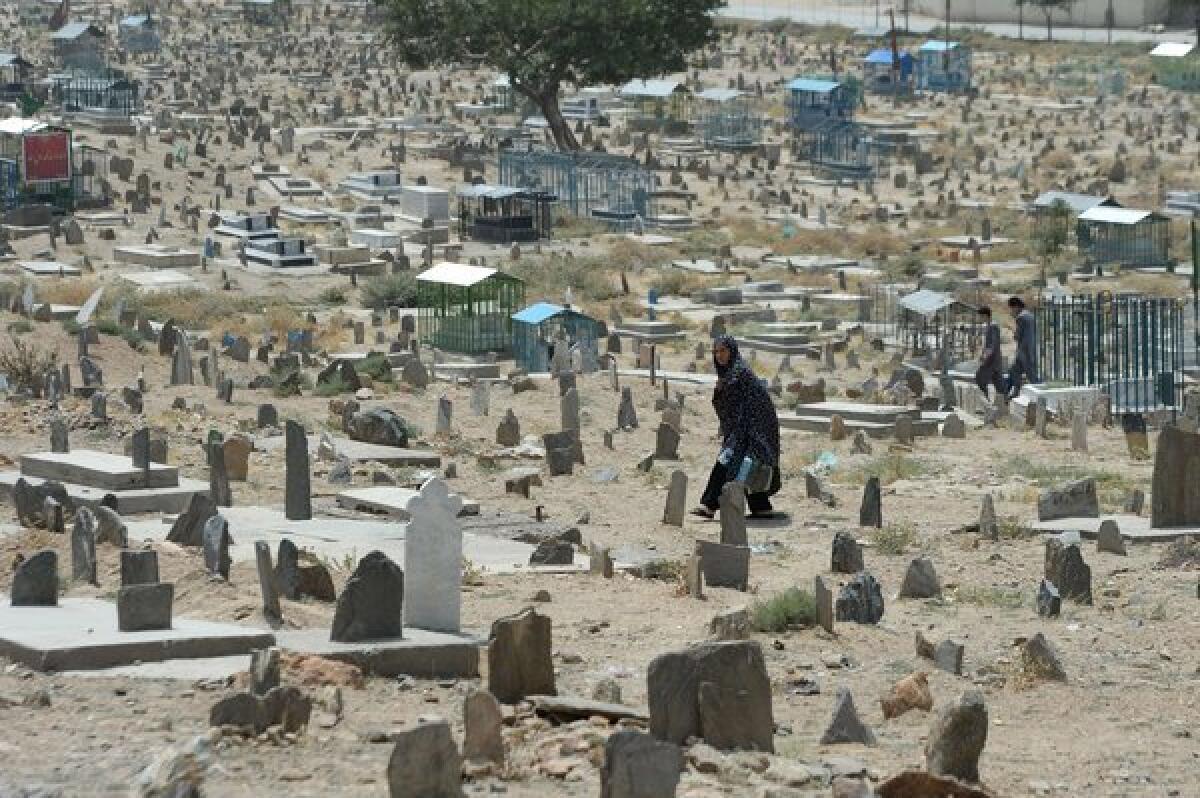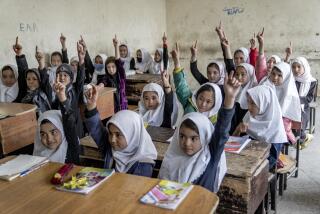Afghanistan civilian casualties up sharply this year, U.N. says

- Share via
KABUL, Afghanistan -- The number of civilians killed and wounded in Afghanistan grew by almost 25% in the first half of this year as Afghan forces assumed more responsibility for the nation’s security, according to a U.N. report released Wednesday.
The increase reversed a decline last year that many hoped spelled improved conditions for the most vulnerable victims of the nearly 12-year-old war.
Analysts say stepped-up militant attacks against the Afghan government have resulted in more civilians getting caught in the crossfire or being targeted for their perceived government support. Foreign combat troops are scheduled to leave the country in late 2014.
In the first six months of this year, 1,319 civilians were killed in war-related violence in Afghanistan, compared with 1,158 in the first half of 2012, with women and children affected disproportionately. In addition, 2,533 civilians were injured, compared with 1,976 a year earlier. The worst year on record for civilians was 2011.
Ordinary Afghans say fear is a constant companion. “No one cares about civilians in this country,” said Zulmai Badri, 55, an unemployed Kabul resident wearing a white shalwar kameez (the traditional outfit of tunic and loose pants) and a short beard. “The high-ranking officials keep their families in Europe and don’t care about our fate.”
Badri said he recently drove to Kandahar and wrapped a blanket around the arm closest to the window hoping it might slow down a bullet in any attack. “No one knows what might happen even a few hours from now,” he added.
According to the report, the Taliban and other militant groups were responsible for most of the 23% jump in civilian casualties through indiscriminate roadside bombings, armed assaults and suicide attacks in populated areas. Fighting between insurgents and Afghan security forces was the next-largest cause of civilian deaths.
Atiqullah Amarkhail, a Kabul based military analyst, said the Taliban shelter in people’s homes, abduct civilians as human shields and kill more civilians than security forces with roadside bombs. But NATO and Afghan forces are also cavalier, he added.
“To be honest, neither side respects civilian life,” he said. “If we don’t find a political solution, casualties will only increase.”
In a statement, the Taliban decried Wednesday’s report as propaganda, adding that Washington arm-twisted the U.N. to reach its “totally biased” conclusions. Many of those identified as civilians by the report were actually soldiers, police and intelligence officials, it said, and international forces are responsible for far more than the 9% of casualties claimed by the UN. “We strongly reject this unfounded report,” the group said.
In recent months, the Taliban has displayed more sensitivity toward civilian casualties, given their potential to undermine public support. It has publicly condemned attacks that kill ordinary people even as it blames these on government or NATO forces.
Civilians say they respond in varied ways to the growing danger. Some try to avoid crowds or traffic jams, which suicide bombers often target. Others dress down, leave behind ID cards and erase cell phone contacts when traveling by bus, hoping to avoid notice if they’re stopped at a road block. Kidnappers and the Taliban sometimes call passengers’ saved numbers to identify them and see if they’re wealthy or government employees.
“We try to look as ugly as possible so we don’t get pulled off the bus,” said Hamidullah, 19, a computer science student at Kabul University who uses one name. “The deteriorating situation is making everyone more stressed out.”
Rising casualty rates have reinforced concerns that Afghan forces won’t be able to take on the militants after foreign troops leave. The Afghan army is plagued by poor morale, high desertion rates, weak training, equipment shortfalls and limited medical support.
Civilian deaths are also a growing point of tension between Kabul and Washington. President Hamid Karzai banned foreign private security firms in 2010 and halted U.S. special forces operations this year in central Wardak province over civilian deaths. A war crimes investigation was recently launched after the bodies of 10 civilians were found near a base used by U.S. special forces.
ALSO:
Iran gives Gazans aid, but bypasses Hamas
Israeli and Palestinian negotiators agree to tackle tough issues
Spain train driver on tape during questioning: ‘I won’t make it’
Special correspondent Baktash reported from Kabul, and Magnier from New Delhi.
More to Read
Sign up for Essential California
The most important California stories and recommendations in your inbox every morning.
You may occasionally receive promotional content from the Los Angeles Times.










